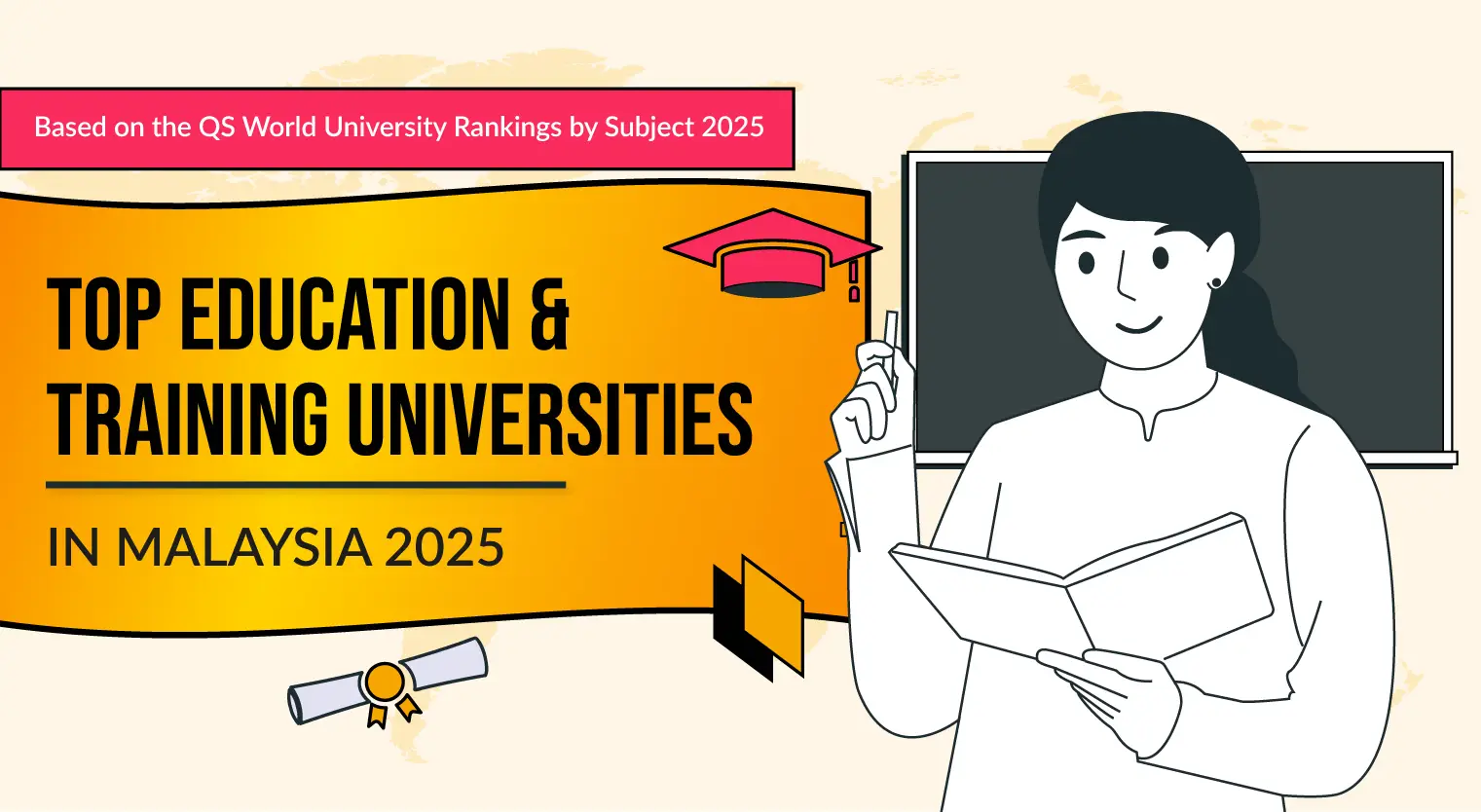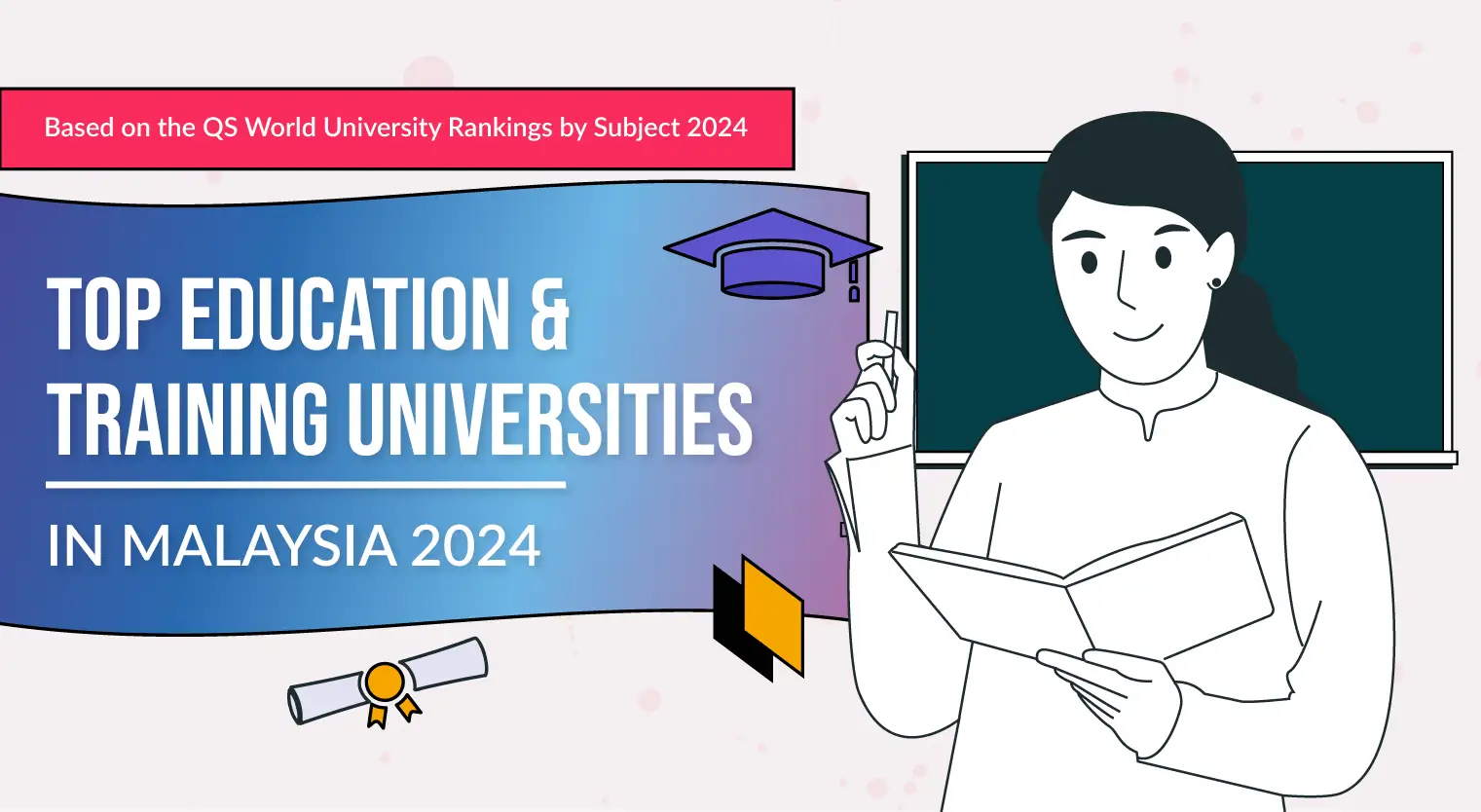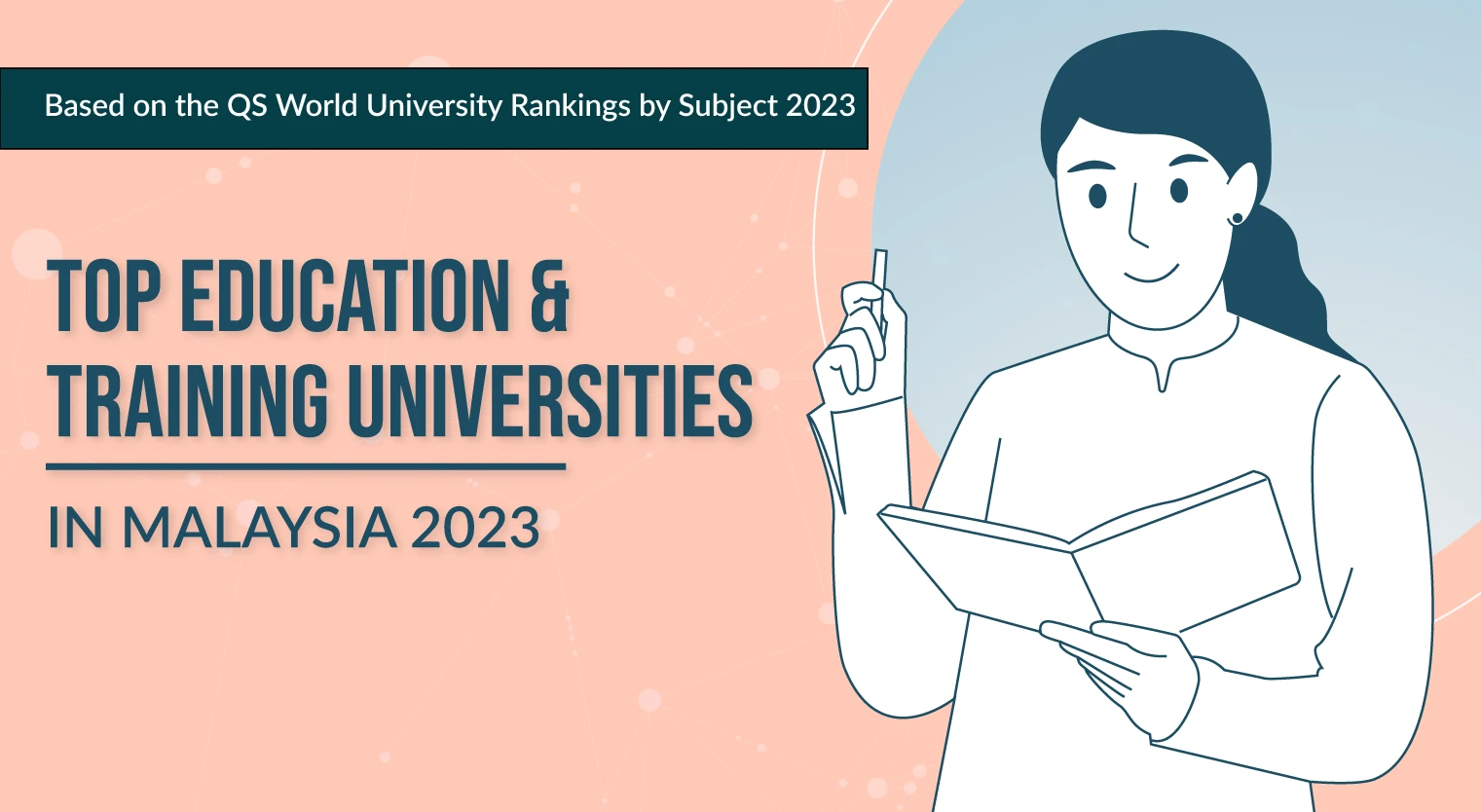How To Be a Teacher in Malaysia
There are many ways to become a teacher in Malaysia. Here are the most popular ones.
Updated 24 Feb 2025

Teachers are one of the most vital members of our society. They shape the next generation of leaders and as such, bear a great responsibility to guide the students in the right direction.
If you’re interested in taking on the challenge, here are the pathways of how you can become a teacher in Malaysia.
Option #1: Take the Program Ijazah Sarjana Muda Perguruan (PISMP) at the Institut Pendidikan Guru (IPG)
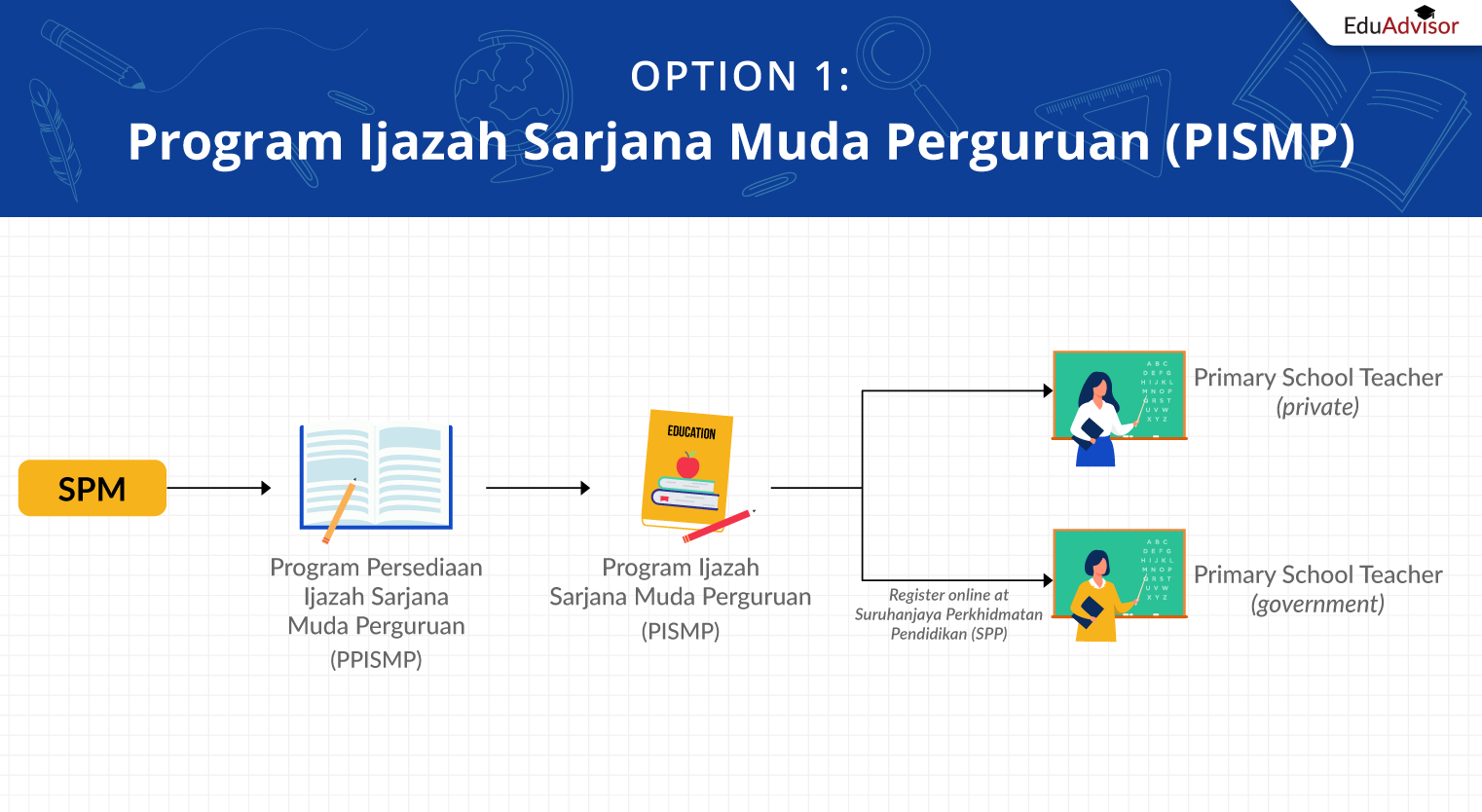
One of the most popular ways to get into the teaching profession is by enrolling into the Institut Pendidikan Guru (IPG). This will enable you to be a primary school teacher in government primary schools, i.e. Sekolah Kebangsaan (SK).
You’ll first take the Program Persediaan Ijazah Sarjana Muda Perguruan (PPISMP), a preparatory programme after SPM. Subsequently, you will pursue the Program Ijazah Sarjana Muda Perguruan (PISMP), a bachelor’s degree in teaching.
Here’s a walkthrough of how this route will look like from SPM.
a) Meet the minimum requirements at SPM level
To get into IPG, you must first meet the minimum requirements set by the institution.
You will need:
- A minimum of grade A- in any 5 subjects; and
- A minimum of grade C in Malay, History and English; and
- Meet the minimum requirements of your field of specialisation* (if applicable)
*For instance, specialising in Pendidikan Seni Visual (Visual Arts Education) requires you to have an SPM grade of A- in that subject.
To apply, simply submit your application at https://pismp.moe.gov.my/ where you will be asked to choose the major you are interested in. If selected, you will then be asked to take the Ujian Kelayakan Calon Guru (e-UKCG) as well as submit a Video Pengajaran (VP) and Video Kecergasan Fizikal (VKF).
Once you’ve met all the requirements, you will begin your studies with the Program Persediaan Ijazah Sarjana Muda Perguruan (PPISMP).
b) Complete the Program Persediaan Ijazah Sarjana Muda Perguruan (PPISMP)
Your entry into this route starts with the Program Persediaan Ijazah Sarjana Muda Perguruan (PPISMP). The PPISMP is a one-year preparatory programme similar to a pre-university course. Completion of the programme will allow you to progress your studies at the degree level where you will enrol into a programme called Program Ijazah Sarjana Muda Perguruan (PISMP).
c) Complete the Program Ijazah Sarjana Muda Perguruan (PISMP)
The PISMP is a 4-year bachelor’s degree programme (with honours) offered by the Ministry of Education. In your studies, you will be taught on how to be an effective educator. You will learn more about your subject specialisation and how best to teach it. As part of your studies, you will also have to complete an internship which involves visiting schools to participate in teaching practicals and observations.
d) Register online at Suruhanjaya Perkhidmatan Pendidikan (government schools only)
After you’ve finished your studies, you will have to register with the Suruhanjaya Perkhidmatan Pendidikan (SPP). After registering, you will be called for an interview. Upon passing the interview, you can then wait for a teaching posting.
PRO TIP
SPP only applies if you’re interested in teaching in government schools. Private institutions may have different requirements so even if you’re not registered with SPP, you will always have the option of teaching in the private sector.
e) Become a teacher
Upon successful completion of the PISMP and registering with SPP, you will have the licence to teach in government primary schools in Malaysia.
Overall, this route will take you 5 years to finish.
Option #2: Take a Diploma in Education

Securing admission into an IPG can be hard. However, if you don't get accepted, you can still become a teacher through other routes.
One option is to take a Diploma in Education after SPM. This will enable you to be a primary school teacher. This route will look like below.
a) Meet the minimum requirements at SPM level
To qualify for a Diploma in Education, you will need at least a C in any 3 subjects for your SPM. The exact entry requirements may vary between institutions so make sure to confirm the details carefully.
b) Complete a Diploma in Education
Similar to other diploma programmes, a Diploma in Education can take 2 – 3 years to finish.
In this programme, you will learn everything you need to become a good teacher. You will be taught various teaching-learning methods, how to deliver the curriculum effectively to different types of learners and more. You will also be required to complete a teaching practicum where you will be tested on your understanding and mastery of your study materials.
c) Register online at Suruhanjaya Perkhidmatan Pendidikan (government schools only)
Completing the programme is not enough. Before you can become a teacher at government schools, you must register at the Suruhanjaya Perkhidmatan Pendidikan (SPP) website. Afterwards, you will be called in for an interview. If you pass, you will be asked to choose where you want to work. And then, it becomes a matter of waiting.
PRO TIP
SPP only applies if you’re interested in teaching in government schools. For private schools, you may apply with them directly.
d) Become a teacher
Once you’ve received your posting call from the govermment, you can finally become a teacher at primary schools. While the route will typically take 2 – 3 years, do bear in mind that it might take some time before you get your posting call.
If you want to teach in the private sector, you can apply to the schools directly after completing your Diploma in Education.
Note that a Diploma in Education will only allow you to teach in primary schools. If you want to teach in secondary schools, you’ll need at least a degree.
Option #3: Take a Degree in Education

The PISMP and Diploma in Education routes are only applicable for primary school teachers.
If you want to teach at the secondary school level and beyond, you will need at least a Degree in Education. Here’s how it will look like.
a) Complete a pre-university or diploma programme after SPM
Upon completing SPM, you’ll need to take a pre-university (e.g. A Levels, SACEi, STPM, etc.), a foundation or a diploma programme. The entry requirements into these courses vary so check directly with the institutions if you are unsure.
b) Meet the minimum requirements for entry into degree
The minimum entry requirements into a Degree in Education are:
- Minimum of 2Ds in A-Level
- Minimum of 2Cs in STPM
- Minimum CGPA of 2.00 in Foundation in Arts (or any relevant Foundation programmes)
- Minimum CGPA of 2.00 in a relevant diploma
c) Complete a Degree in Education
An accredited Education Degree will equip you with the relevant skills needed to help you teach effectively. You will not only learn about the subject you will be teaching, but also teaching styles and methodologies you can employ to ensure your teaching competency.
As part of the programme, you will also be expected to join a teaching practicum, where you will spend a semester working as a practical teacher in a school.
Most education degrees will take 3 years to complete.
d) Register online at Suruhanjaya Perkhidmatan Pendidikan (government schools only)
Before you can become a teacher in a government school, make sure to register with the Suruhanjaya Perkhidmatan Pendidikan (SPP) website. From there, wait for an interview call. Should you pass the interview, you will then have to wait for your posting call.
PRO TIP
SPP only applies if you’re interested in teaching in government schools. For private and international schools, you may apply with them directly.
e) Become a teacher
Graduating with a Degree in Education will give you the DG41 grade in the civil service, which will allow you to teach at the secondary education level. While this route typically takes 4 – 5 years to complete, you should know that waiting for a posting call might take you some time.
If you’re keen on teaching in private or international schools, you may apply directly after completing your Degree in Education.
Apply for university with EduAdvisor
Secure scholarships and more when you apply to any of our 100+ partner universities.
Start nowOption #4: Take a Postgraduate Diploma in Education
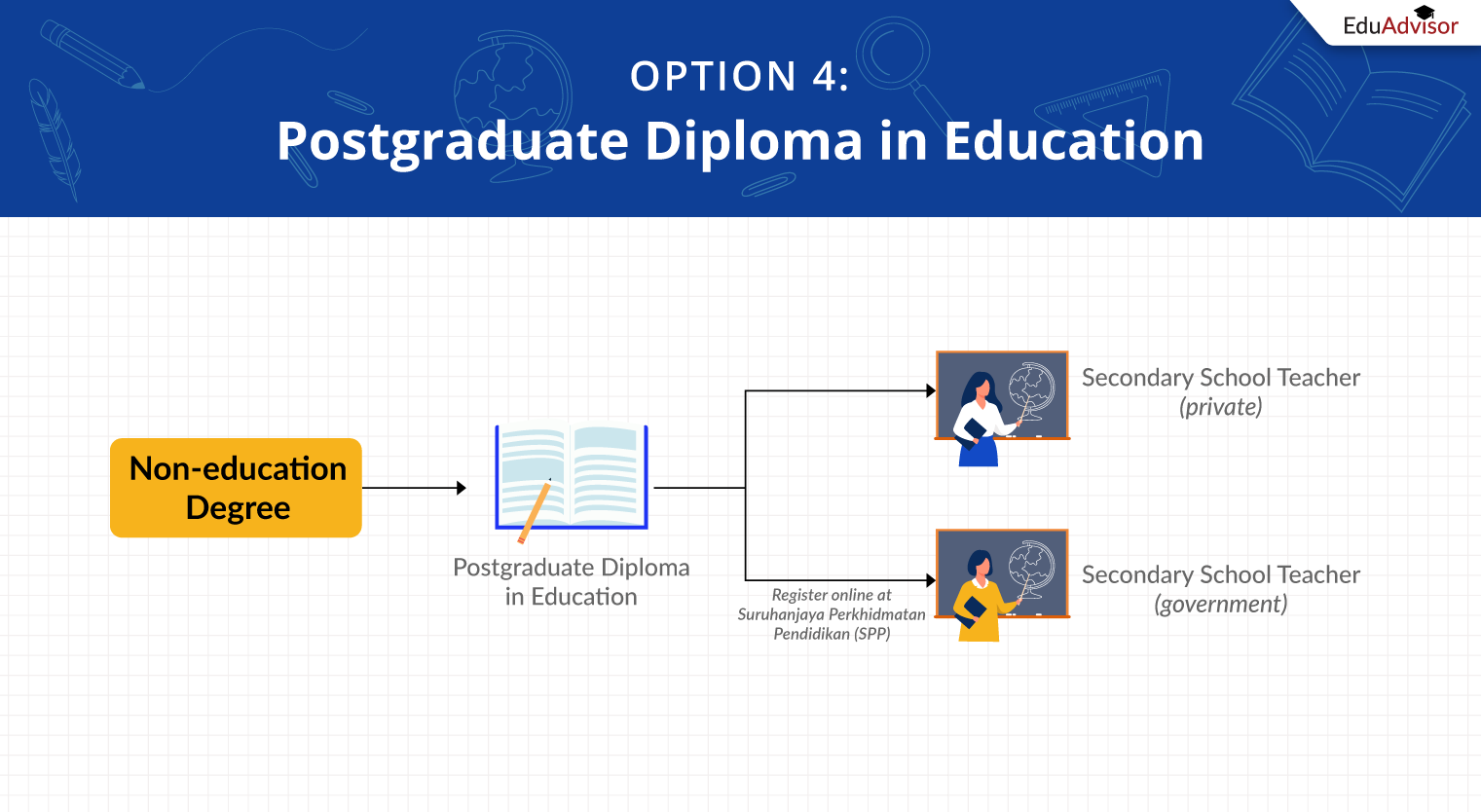
Not everyone knows they want to be a teacher early on. Some only find that passion later in life. If you’re one of those people, you might think that you’ll never get to become a teacher because you didn’t take the right degree at university, or that you must start over and pursue another degree, this time in education.
But that’s not true. If you already have a degree that’s unrelated to teaching or education, you can still become a teacher by pursuing a Postgraduate Diploma in Education. Here’s how.
a) Complete a degree programme
First, complete an accredited degree of your choice as planned.
b) Complete a Postgraduate Diploma in Education
A Postgraduate Diploma in Education is a 1-year postgraduate programme that will prepare you to become an educator — even without a degree in education. This postgraduate programme is available at both public and private universities.
If you want to qualify as an educator in government schools, it’s best to take the Diploma Pendidikan Lepasan Ijazah (DPLI) or Diploma Pendidikan Pasca Siswazah (DPPPI) at public universities.
Otherwise, if you want to teach at private schools, you may pursue this postgraduate diploma at any university of your choice.
c) Register online at Suruhanjaya Perkhidmatan Pendidikan (government schools only)
Similar to other routes, you will have to register with the Suruhanjaya Perkhidmatan Pendidikan (SPP) before you can teach in government schools. There will be a call to interview and should you pass, you’ll have to wait for the posting call.
PRO TIP
SPP only applies if you’re interested in teaching in government schools. Private institutions have different requirements so you can teach in the private sector without an SPP recognition.
d) Become a teacher
Once you’ve gotten your posting call from the government, you can now begin your career as a teacher in government schools. For the private sector, you may apply directly after completing your postgraduate diploma.
All in all, this path can take around 5 – 6 years.




